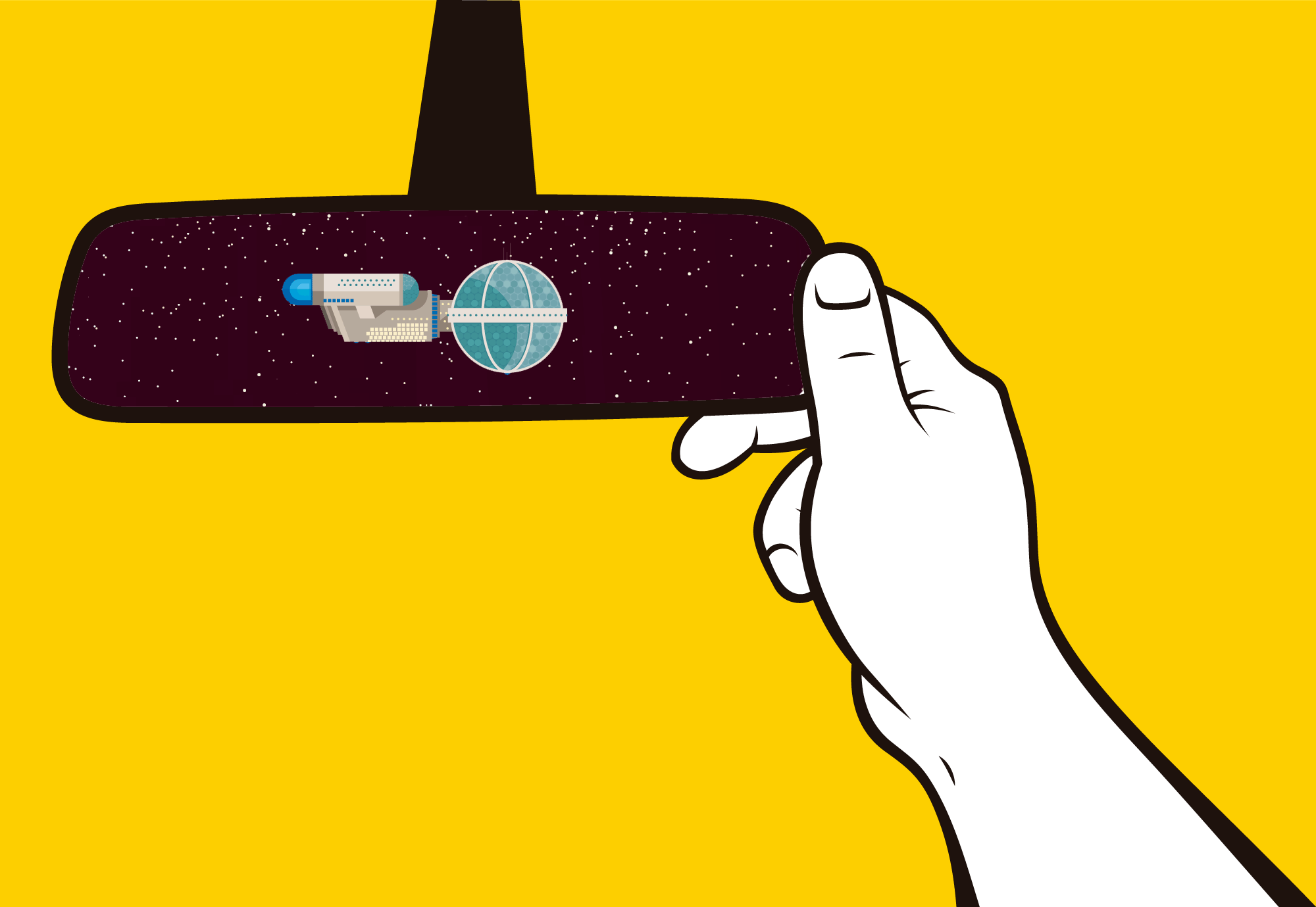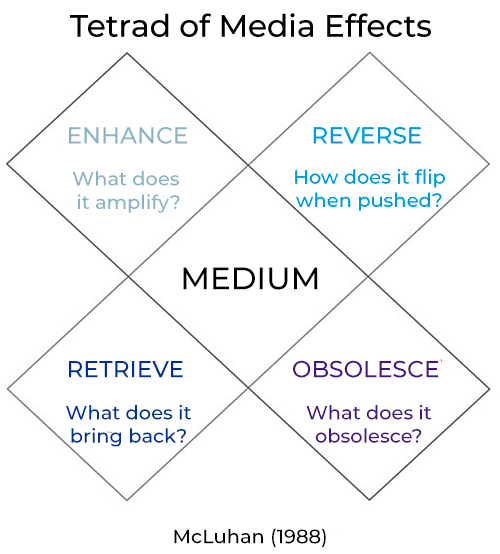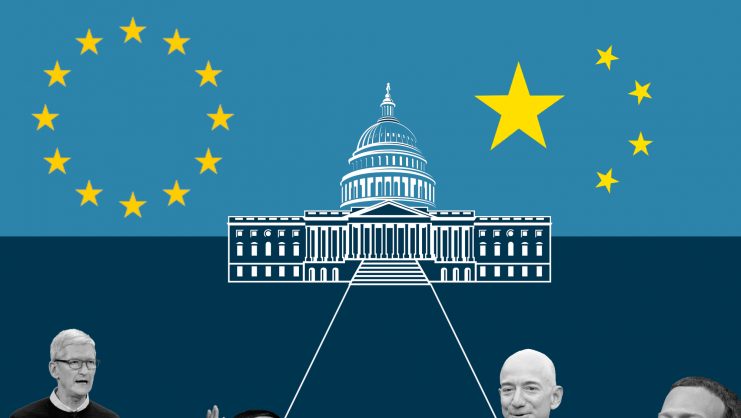As a boy, I was an avid Star Trek fan. Until recently, I also thought the show offered a plausible vision of the future: a diverse crew, led by an American Captain, representing a “Federation” of intergalactic reach. In the last few years, however, I have realized that the newest wave of change – digital technologies – probably won’t unlock “phasers,” “transporter rooms,” and a “Federation.” Instead, digital technologies may usher in a neo-Medieval world of aristocrats, religious upheaval, and decidedly “pre-modern” sensibilities among many.
A future resembling the distant past seems counterintuitive (maybe even crazy!), so let me explain why I think that, in the words of the Center for the Study of Digital Life, “Digital retrieves the medieval.” It’s easy to suffer from what I call (after another TV program of my youth), “The Jetsons problem.” That’s shorthand for the naive view that technologies are culturally, politically, and socially neutral. George Jetson and his family were a typical, traditional American family of the 1960s, but with rocket ships and robot maids. In this view, the future is essentially the present, plus gadgets.
Anyone with even a passing knowledge of history, however, knows that “gadgets” matter a great deal, especially communications technology. From the pre-Westphalian (i.e. medieval) age of hand-written script, to the mechanically-printed type (starting circa 1450) that helped launch the Westphalian age, to electrically-transmitted codes (circa 1850) of the telegraph, and then to voice and picture transmission (radio & TV), societies have been shaped and re-shaped by changing technologies. Print kicked off both the Protestant Reformation and the rise of books written in the vernacular, which solidified the nations of Europe. You may not be a political scientist, but can you imagine a Mussolini, a Hitler, a Churchill or a Franklin Roosevelt without radio? In other words, politics and society are profoundly shaped by the media environment.
We shape our technologies, and then our technologies shape us.
Why? Because technologies – including digital technologies – are what Aristotle referred to as “Formal Causes.” They shape our choices, alter power structures, and restructure our thinking. Technologies create new “psycho-technical environments,” transforming mindsets, identities, and values as much as economies, institutions, and power structures do. In other words, contra conventional “social science,” technologies are not neutral. Humans are infinitely plastic, but the technologies they habitually use have cultural, psychological, and sociological consequences. As a man named John Culkin put it, “We shape our technologies, and then our technologies shape us.”
Another way to think of formal cause is to invert the usual idea of political leadership: new technologies produce new values, concerns, and identities among people who use them habitually, and then those new audiences demand new political artists. In other words, leaders are symptoms – not causes – of social change engendered by new technology.
Let me be more specific: love Donald Trump or hate him, I suggest that you understand that he is the political version of Uber. How? Uber used digital technology to go over the heads of incumbent service providers (existing taxi firms) to speak directly to customers who felt under-served. And Trump? He used digital technologies to go over the head of incumbent service providers (the traditional Democratic and Republican Parties) to communicate directly with customers who felt under-served (and then took over one of the old firms). Digital disruption applies to more than business models!
As digital technologies spread, the deep social, cultural, and political changes are only just starting. Inasmuch as the quality of your life largely depends on the quality of your questions (and luck! I can’t help you there), you might want to think more about what that means. To glimpse the direction of this transformation, I suggest a question-generating tool developed by the prominent Canadian media theorist of the late 1970s, Marshall McLuhan. He called it his “Tetrad of Media Effects.”
McLuhan’s Tetrad: A Generator of Key Questions
A tetrad, of course, is simply something with four parts. But McLuhan’s tetrad of “media” effects is a bit misleading because it is actually designed to probe the impact of technologies more generally, not just media. That is why, in Understanding Media: The Extensions of Man (published 1964), McLuhan considers the social and psychological impact of “media” like locomotives, light bulbs, typewriters, and even clothing.
As the title of that volume indicates, McLuhan argues all media or technologies are best viewed as extensions or enhancements of some human function. You then pose four questions about the technology and it is these questions the tetrad captures.
Using the Tetrad, one asks of every artifact, medium, or technology, first what human function does it enhance or amplify? Cars, for example, enhance human legs. In digital technologies’ case, it is human memory that is enhanced.
Most people understand that new technologies also will obsolesce the previous technology used to perform that function. Cars, for example, made horses obsolete, and digital technologies are making paper-based memory systems (from books to paper currency) fade away.
It is at this point, at enhancement and obsolescence, which most people “get off the analytic bus”, and simply stop thinking. McLuhan, however, insists that you ask two other questions about technologies. The next part of the tetrad demands a sense of irony. It makes you ask, “If this new technology spreads far enough, does it reverse or flip into a contradictory form?” Cars, for example, speeded up travel…until they reversed into traffic jams. Likewise, digital technologies seemed to have ushered in the “information age”…until they reversed into information overload and disinformation.
We are still at the “horseless carriage” stage of digital technologies, where the new technology is used and understood mostly in old ways.
It is the fourth question the Tetrad requires, however, that I find the most interesting. It demands that you consider: “As this technology spreads and human involvement with it deepens, what parallel period of history might it retrieve?” In so doing, it sort of instrumentalizes Mark Twain’s famous dictum that “History doesn’t repeat itself, but it often rhymes,” making you look for the old forms reborn under the new technological conditions.
This is especially hard to imagine. We are still at the “horseless carriage” stage of digital technologies, where the new technology is used and understood mostly in old ways. (Don’t believe me? Then why do you call that movie-camera/supercomputer/world-library/GPS/motion-sensor that you carry around and look at 70 times a day a “telephone”?) But just as you would never understand even the economic impact (not to mention the cultural and social effects!) of automobiles if you referred to them (as people did) as “horseless carriages,” you must be willing to look beyond that digital device as a “telephone.”
For example, if politics have seemed strange lately, just wait! The reason is, digital technology will retrieve medieval forms. In politics, the international system is composed entirely of nations and states created under pre-digital, analog conditions.
Let me present in a somewhat cartoonish fashion some parallels between the Middle Ages and our own time. Do you recognize:
- The growth of a transnational aristocracy, so-called “elites” of enormous wealth, ambiguous nationality, and flexible allegiances? Consider different countries’ “Golden Visa” programs, the entire offshore finance industry, and the many children of autocratic leaders who flit from country to country. Think of growing wealth inequality not just among but within nations.
- An international climate in which non-state actors like companies are powerful enough to challenge states? Think of Google or Facebook’s disputes with nations. Did you know that Denmark now has a “Tech Ambassador” permanently stationed in three locations: Copenhagen, Beijing, and Silicon Valley? They get it. Nations are like medieval kings – powerful, but still needing to deal with important barons.
- Or think of non-state actors like NGOs. Countries can no longer ignore them whether they want to save the rainforests (e.g. Greenpeace) or restore the Califate (e.g. Al-Qaeda). And speaking of which, what happened to the idea that states retain a monopoly on legitimate violence?
- A shift in popular opinion back towards local/tribal or religious allegiances? Much of what people call “populism” around the world is actually a demand for local – even tribal or explicitly religious – rather than national “solutions” and organizational forms.
- Consider the birth of new cults, social movements, and religions. In the pre-digital world, these were difficult, expensive, and slow to get started because they required materials and people (clergy, buildings, choirs, incense, stained glass, etc.) to influence large numbers of a population’s biochemistry and sense of self. In the digital era, you just need code, apps, or even a website. Hence the rapid spread of cultish social movements like Q-Anon or Extinction Rebellion. Yuval Harari pointed out in Sapiens that this is especially the case via games like Pokémon-Go, which blend the digital world and the real world, helping those with the right digital lenses to see things that non-players do not.
- In Europe, I don’t foresee a breakup of the European Union so much as a return to a sort of Holy Roman Empire (which was, please note, based in Aachen, not far from Brussels.) It had a Franco-German “motor”, included northern Italy, and while not always effective, exercised limited sway and authority (especially when local powers could agree on issues.)
- Digital technologies now allow global migrants to find the best migration destinations and routes, to connect with people-smugglers, and to arrange payment from their families after they take an on-location selfie as “proof of life.” Indeed, according to a private conversation I had with a FRONTEX employee, migrants even rate smugglers the way you and I rate an Uber driver. In the Middle Ages, people built castles…and now, people demand walls on borders, making the state itself their estates.
- Is it an accident that the premier trade agreement of the 21st century is named for the medieval Tang Dynasty’s “Silk Road”? Chinese leaders have mentioned the precedent.
- In the Middle Ages, people in Europe could pre-pay for their sins (often at a discount) through “indulgences.” Before you laugh, ask yourself what you are doing when you buy that expensive coffee, but comfort yourself by paying extra for “Fair Trade”…or consider that “carbon credit” you bought along with your holiday flight.
This article is intentionally provocative – an essay, a probe, a test of ideas. It’s important to be skeptical. It’s also important to, at the very least, consider what happens if our assumptions are not exactly what they seem – and what comes next. For example, what happens to the various power structures that govern our lives and shape our identities if digital technologies are not as “neutral,” psychologically, culturally, and sociologically, as we originally assumed? Is that Star Trek “Federation” paradigm of future international relations – the “One World” or “Global Order” – simply a pipedream under digital conditions? It is time to start thinking beyond digital disruption in business, and start thinking about digital disruption of our culture, identities, and politics.
© IE Insights.









